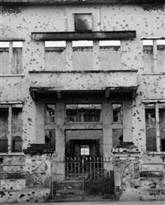
The US Civil War lasted from 1861 to 1865 and was about the secession of the Confederate States of America from the United States of America.
What can be said about this conflict with modern eyes? Was it unavoidable? What about the root causes?
This is a filmseminar where we begin by Screening of episode one of the documentary “The Civil War” by Ken Burns. This is followed by a discussion with CSCW Director Scott Gates and Former Governor of South Carolina David Beasley. They are both descendants from soldiers who fought in the Civil war- but on opposite sides.
Free entrance. All American refreshments
There are things to learn from studying the US Civil War that are useful for modern conflict – and vice versa. For instance, a lot of what we today talk of as “New Wars” were present even at that time, and the fighting was not so dissimilar to what one can observe today. However, there are important differences too. The US Civil War was fought between two parties using the latest technology, and indeed developing new technology and ways of fighting during the course of the war. It was the high tech war of its time. This in contrast to the modern civil wars that often are asymmetrical, and fought with relatively simple technology.
David Beasley (Republican) was involved in the Confederate battle flag controversy in 1996-7, as Governor of South Carolina, when he called for removing the flag from the state capitol and moving it to a separate Confederate memorial on the capitol grounds. South Carolina was the only state that flew the Confederate battle flag over its Capitol, a gesture that many whites saw as a tribute to their Southern heritage but that many blacks saw as a symbol of latent racism. The flag was first raised over the Capitol in 1962, largely to express defiance of the civil rights movement. The controversial proposal split the state's voters; by November 1997 the issue had died, but many political analysts believe Beasley's loss in the 1998 governor's race can be partly attributed to his stance on the flag. In 2003, Beasley was awarded the John F. Kennedy Profile in Courage Award by U.S. Senator Ted Kennedy for his controversial request. An award given to individuals (often elected officials) who, by acting in accord with their conscience, risked their careers or lives by pursuing a larger vision of the national, state or local interest in opposition to popular opinion or pressure from constituents or other local interests.
This film seminar is part of the National Science Week in Norway.
The Centre of Excellence was accorded to PRIO in 2002 following a fierce competition, and has been in operation from 2003 until the end of this year. The knowledge will live on at PRIO, but now without the special funding and status from the Research Council of Norway.
For a week in September 2012 we try to take stock of what we have done in the last ten years and to think ahead for the future research efforts.





